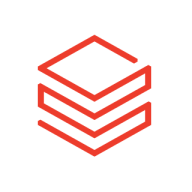

Find out in this report how the two Cloud Data Warehouse solutions compare in terms of features, pricing, service and support, easy of deployment, and ROI.
| Product | Market Share (%) |
|---|---|
| Databricks | 10.0% |
| Snowflake | 15.9% |
| Teradata | 8.4% |
| Other | 65.7% |
| Product | Market Share (%) |
|---|---|
| Oracle Analytics Cloud | 1.2% |
| Microsoft Power BI | 8.9% |
| Tableau Enterprise | 6.2% |
| Other | 83.7% |


| Company Size | Count |
|---|---|
| Small Business | 26 |
| Midsize Enterprise | 12 |
| Large Enterprise | 56 |
| Company Size | Count |
|---|---|
| Small Business | 12 |
| Midsize Enterprise | 7 |
| Large Enterprise | 11 |
Databricks offers a scalable, versatile platform that integrates seamlessly with Spark and multiple languages, supporting data engineering, machine learning, and analytics in a unified environment.
Databricks stands out for its scalability, ease of use, and powerful integration with Spark, multiple languages, and leading cloud services like Azure and AWS. It provides tools such as the Notebook for collaboration, Delta Lake for efficient data management, and Unity Catalog for data governance. While enhancing data engineering and machine learning workflows, it faces challenges in visualization and third-party integration, with pricing and user interface navigation being common concerns. Despite needing improvements in connectivity and documentation, it remains popular for tasks like real-time processing and data pipeline management.
What features make Databricks unique?
What benefits can users expect from Databricks?
In the tech industry, Databricks empowers teams to perform comprehensive data analytics, enabling them to conduct extensive ETL operations, run predictive modeling, and prepare data for SparkML. In retail, it supports real-time data processing and batch streaming, aiding in better decision-making. Enterprises across sectors leverage its capabilities for creating secure APIs and managing data lakes effectively.
Oracle Analytics is a complete platform with ready-to-use services for a wide variety of workloads and data.
Oracle Analytics allows businesses to add AI and machine learning capabilities to any application—and as part of our integrated suite of cloud services to comply with data security and connected without disrupting business operations.
Offering valuable, actionable insights from all types of data—in the cloud, on-premises, or in a hybrid deployment—Oracle Analytics empowers business users, data engineers, and data scientists to access and process relevant data, evaluate predictions, and make quick, accurate decisions.
Oracle Analytics Cloud Features
Oracle Analytics Cloud has many valuable key features. Some of the most useful ones include:
Oracle Analytics Cloud Benefits
There are many benefits to implementing Oracle Analytics Cloud. Some of the biggest advantages the solution offers include:
Reviews from Real Users
Below are some reviews and helpful feedback written by PeerSpot users currently using the Oracle Analytics Cloud solution.
Fabricio Q., Data Analytics Manager, says, “The main functionality is great and everything is pretty standard and easy to use. It's great for consolidation and creating one source of truth. The initial setup is pretty straightforward.”
PeerSpot user, Eric B., Independent Consultant - Oracle BI Applications at Desjardins, mentions “It's really an enterprise solution. It has standard dashboarding functionality. It also has reporting capabilities for producing pixel-perfect reports, bursting large volumes of a document if you need to. It has interactive data discovery functionality, which you would use to explore your data, bring your own data, and merge it with maybe the data from an enterprise data warehouse to get new insights from the pre-existing data. It has machine learning embedded in the solution.”
Gaurav S., Vice President Credit Risk Management at a financial services firm, explains, “From a financial or bank perspective, this product is secure enough. The dashboards, analytics, visualizations, and different reports are valuable for business analytics. The AI/ML enablement is useful, as many reporting tools do not offer machine learning models as of now, without writing customized code.”
Another reviewer, Trinh P., Delivery Manager at Sift Ag, comments, "The specific capability I find important in Oracle Analytics Cloud is that it allows the basic user to easily drag and drop data. I also like that the solution allows the user to decide what to measure and what to see in the reports."
We monitor all Cloud Data Warehouse reviews to prevent fraudulent reviews and keep review quality high. We do not post reviews by company employees or direct competitors. We validate each review for authenticity via cross-reference with LinkedIn, and personal follow-up with the reviewer when necessary.